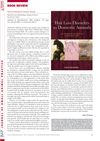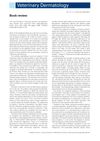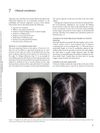 March 2024 in “bioRxiv (Cold Spring Harbor Laboratory)”
March 2024 in “bioRxiv (Cold Spring Harbor Laboratory)” Minoxidil treatment improves heart defects in a DiGeorge syndrome model.
 1 citations,
March 2024 in “BioDrugs”
1 citations,
March 2024 in “BioDrugs” Biologics for severe asthma have known side effects, but some new risks need more study.
 January 1987 in “Side effects of drugs annual”
January 1987 in “Side effects of drugs annual” Some cosmetics and dermatological drugs can cause allergic reactions and side effects, like skin irritation and systemic issues.
 July 2024 in “Indian Journal of Dermatology Venereology and Leprology”
July 2024 in “Indian Journal of Dermatology Venereology and Leprology” Certain gene variations in PITX2 are linked to a higher risk of male pattern baldness in Indians.


World War II led to major advancements in American military medicine.
 2 citations,
January 2017
2 citations,
January 2017 PCOS is a common hormonal disorder in women that can lead to various health issues and requires comprehensive management.
 4 citations,
October 2012 in “Expert Review of Dermatology”
4 citations,
October 2012 in “Expert Review of Dermatology” Dermoscopy greatly improves melanoma diagnosis and reduces unneeded surgeries.

Botulinum toxin type A significantly reduces scalp psoriasis severity compared to placebo.
11 citations,
July 2021 in “Genetics selection evolution” Researchers found genes and genetic variants linked to sheep wool and skin wrinkles.

The books were useful but had some areas needing improvement.
July 2002 in “Journal of applied cosmetology” Hair growth issues can be linked to genetics, diseases, or medications, and new treatments are being developed.
 33 citations,
September 2017 in “Journal of clinical immunology”
33 citations,
September 2017 in “Journal of clinical immunology” New treatments for immune disorders caused by FOXN1 deficiency are promising.
January 2021 in “CRC Press eBooks” Hair loss can have various causes and treatments vary in effectiveness.
37 citations,
January 2005 in “Clinics in dermatology” Recent progress has been made in understanding inherited hair and nail disorders.
 4 citations,
January 2009 in “Wiley-Blackwell eBooks”
4 citations,
January 2009 in “Wiley-Blackwell eBooks” The book explains causes, diagnosis, and treatments for hair loss in pets.
November 2021 in “CRC Press eBooks” Hair shaft disorders cause fragile, brittle, and abnormal-looking hair.
34 citations,
July 2006 in “Clinics in dermatology” Endocrine diseases in dogs often cause skin problems, with hypothyroidism and hyperadrenocorticism being common and leading to hair loss and infections.
 7 citations,
January 2012 in “International Journal of Trichology”
7 citations,
January 2012 in “International Journal of Trichology” A man with Woolly Hair Syndrome had very curly, fragile hair, and doctors used a special scalp examination to diagnose him without invasive tests.
November 2021 in “CRC Press eBooks” Hair color is determined by melanin and can be affected by genetic conditions like albinism.
 18 citations,
March 2016 in “Cosmetics”
18 citations,
March 2016 in “Cosmetics” Telogen Effluvium is a condition causing excessive hair loss due to stress, illness, drugs, or hormonal changes, and can be treated with specific products or naturally resolves after 3-4 years.
 1 citations,
December 2010 in “The journal of small animal practice/Journal of small animal practice”
1 citations,
December 2010 in “The journal of small animal practice/Journal of small animal practice” The book helps veterinarians understand and treat hair loss in animals.
 2 citations,
December 2004 in “Medicine”
2 citations,
December 2004 in “Medicine” Different hair and scalp disorders cause hair loss or excess hair growth, with various treatments available depending on the specific condition.
2 citations,
December 2013 in “Journal of dermatology” A specific gene mutation causes a rare hair loss condition in a Chinese patient.
 20 citations,
July 2008 in “Dermatologic Therapy”
20 citations,
July 2008 in “Dermatologic Therapy” The document says that treating the root cause of hair follicle damage is crucial to prevent permanent hair loss, and treatment options vary.
 45 citations,
December 2009 in “Veterinary dermatology”
45 citations,
December 2009 in “Veterinary dermatology” The book is recommended for its new scientific information and balanced treatment options for hair loss in domestic animals.
9 citations,
August 2021 in “Journal of clinical medicine” Pili torti is a rare condition where hair is twisted and breaks easily, often linked to genetic disorders or other health issues.
2 citations,
April 2021 in “FEBS open bio” Human hair keratins K85 and K35 create unique filament patterns important for early hair formation.
 1 citations,
April 2012 in “Informa Healthcare eBooks”
1 citations,
April 2012 in “Informa Healthcare eBooks” The conclusion is that detailed clinical descriptions help pathologists diagnose hair loss conditions more accurately.
 23 citations,
February 2020 in “PLOS genetics”
23 citations,
February 2020 in “PLOS genetics” Mice with LSS deficiency showed hair loss and cataracts, similar to humans, and can help in understanding and treating this condition.




















